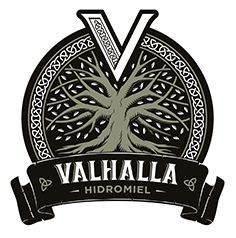- News
- 0 likes
- 28133 views
- 0 comments
- mead, valhalla, toast, history
Raise the cups, crash them and shout health! as a symbol of good wishes. We all do.
This is a widespread custom in our culture but it has its historical background, the same one we want to bring you closer to today.
Whether we desire health, peace or love, the act of giving in itself is a protocolary act that has been maintained for generations.
We all agreed to toast at the same time, we collide our glass with the rest and then we give a drink as a symbolic rubric of the commitment made in the invitation.
There are more solemn and restrained toasts, while others, on the other hand, are more sonorous and noisy. In any case, the toast is always accompanied by a common desire and a unanimous approval, wishing together that all good things are fulfilled.
As a curiosity, the word "toast" comes from the German expression ich bring dir's, which means "I offer it to you". Our language arrived in the sixteenth century from the Italian word brindisi.
Origin of the toast
The clash of glasses has had a different objective, depending on the source being consulted.
In ancient Rome it was thought that wine was enjoyed intensely with the sense of smell, with the sense of touch, taste and sight, but it was thought to be outside the sense of hearing.
Crashing the glasses just before the drink symbolized that you also participated in the sound produced by the drink inside the glass, so you enjoyed it fully and with all five senses.
Different bibliography concerns the origin of the toast to religious rituals in which sacrifices and offerings to the gods were carried out. In these ceremonial acts, sacred liquids were offered, which used to be blood or wine.
This gift was made manifest by raising the prayers to the sky and pronouncing words of flattery towards the deities, something very similar to your health!
It seems that this is the source of the desire/prayer "¡Salud! with which we continue to to toast today.
But more is known about the origin of the toast.
Greek and Roman civilizations, so regular at parties and banquets, used to entertain guests with feasts in which nothing was missing and in which everything (or almost everything) was allowed.
In these meals it seems that the attendees used to crash their drinks to alert the hosts that they had run out of drink. That was the moment when the servants were warned, and with the cups full the celebration could continue.
Another theory of drinking toast alludes to ancient Rome, a time when poisonings were frequent and guaranteed freedom from political rivals.
The moment of drinking was used to introduce lethal substances into the wine.
The hosts, on suspicion of being the target of enemies, asked to hit their own cups with those of their guests. In this way, part of the poison would be poured from one cup to the other in the crash.
If such a circumstance arose, they would both die.
It is not clear the true reason for the toast, although all the theories that circulate have, of course, their logic, and we like to think that they have all contributed to make sense of what we do today by drinking.
From here we show you the hypotheses of which we have knowledge so that you also know them and, of course, we invite you to continue wishing health and prosperity in all your celebrations, better if they are with Hidromiel Valhalla.
Do you know any other theory regarding the origin of the toast? Do you want to add anything else to what we have already told? We look forward to hearing from you.
Good morning and Skol!

Comments (0)